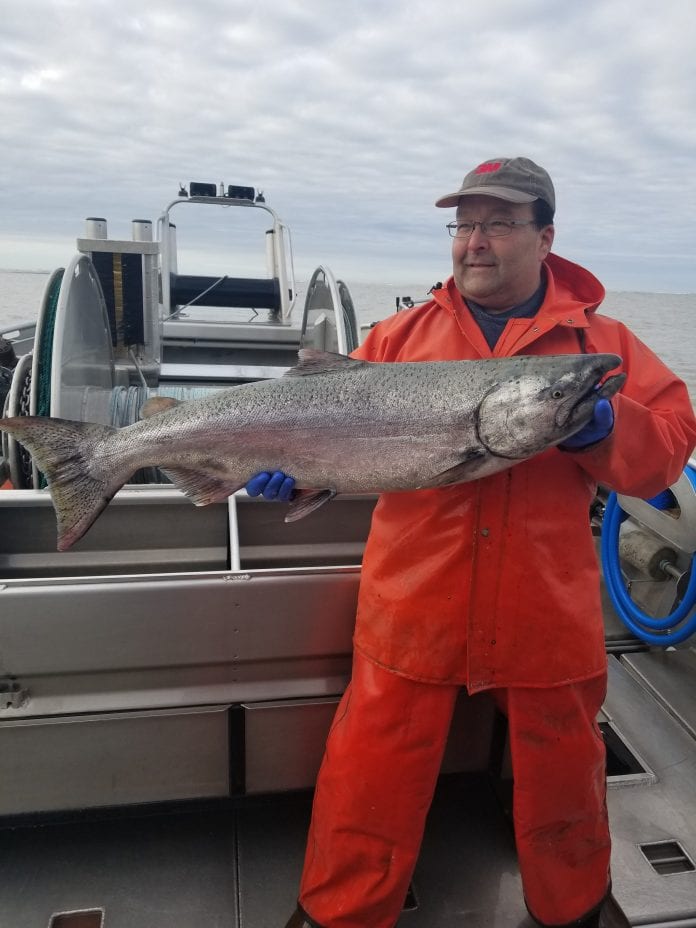In his 46 years as Alaska’s lone representative in Congress, Rep. Don Young helped toss out foreign fishing fleets from Alaska’s waters with the onset of the Magnuson-Stevens Fishery Conservation and Management Act in 1976, and today he is intent on doing the same with offshore fish farms.
The MSA established an ‘exclusive economic zone’ (EEZ) for U.S. fleets fishing from three to 200 miles from shore. Now, a bill introduced by Young aims to stop the Trump Administration’s push to use those waters for industrialized fish farming operations. The fish farms are being touted as a silver bullet to boost seafood production, provide jobs and reduce the $15 billion seafood trade deficit that comes from the nation importing over 85 percent of its seafood.
Earlier this month, Young filed the Keep Fin Fish Free Act which would stop officials from allowing fish farms in U.S. offshore waters unless specifically authorized by Congress.
“The biggest selling power we have in Alaska is wild caught salmon and other fish products and I don’t want that hurt,” Young said in a phone interview. “If we put in a commercial operation offshore, outside of state jurisdiction, we’d have a big problem in selling our wild Alaskan salmon.”
Young’s effort follows a push begun a year ago by over 120 aquaculture and food-related industries to have lawmakers introduce an Advancing the Quality and Understanding of American Aquaculture (AQUAA) Act, which failed to get any traction. The campaign is organized under a new trade group called Stronger America Through Seafood and includes Cargill, Red Lobster, Pacific Seafoods and Seattle Fish Company.
“I was assured they were not going to grow salmon, but they will have to feed all the fish. And that pollution factor can get into the water and contaminate our salmon. And I don’t know who’s going to be involved in it,” Young said. “I’m very supportive of the state waters production of shellfish and kelp, but I’m trying to keep all fish farms off the Alaskan shores, that’s the big thing.”
Young, who is in his 24th term, said he believes most other coastal states are opposed to the idea of large fish feed lot operations off their shores. He added that no one likes the idea of so much fish being imported to the U.S. but said “we shouldn’t weaken our natural system to try to feed our appetite. We should try to increase our natural system and make sure we have more finfish and I’m confident we can do that.”
Young’s bill was immediately hailed by numerous environmental organizations.
“Raising fish in massive cages in federal waters is completely against the public interest and will not solve our food system crisis,” said Shannon Eldredge of the Northwest Atlantic Marine Alliance.
“This is what I’m doing this for,” Young said. “To keep our fish safe and make sure that the best product gets to the market.”
He added that the AQUAA Act has not yet been re-introduced to Congress and he does not believe there is much interest in advancing it.
Sen. Roger Wicker, R-Mississippi, the bill’s sponsor, is reviewing the legislation and working to find a Democratic co-sponsor before re-filing it.
Salmon starts!
Alaska’s 2019 salmon season officially got underway on May 16 with catches of sockeyes and kings at Copper River. A total of 2,237 king salmon and 20,474 sockeyes during the 12-hour opener.
“It looks like we might be back to normal,” said Bill Webber, a 52-year fishing veteran at Copper River, referring to last year when the total sockeye salmon harvest of 44,000 was the lowest in 120 years.
Starting prices also were reported as the highest ever with sockeyes paying out at $10 a pound and $14 for Chinook.
“Fish and Game takes three data points to create a trend and establish how the fishery is going and Mother Nature might throw a curve ball, but I feel optimistic,” Webber added.
For 16 years, Webber’s Paradigm Seafoods has sold much of his salmon directly to customers and he is renowned for the equipment he has created to enhance fish quality. All of the salmon are immediately processed onboard the Paradigm Shift using an automated intravenous pressure bleeding system, which as of this season can be regulated via a cell phone.















